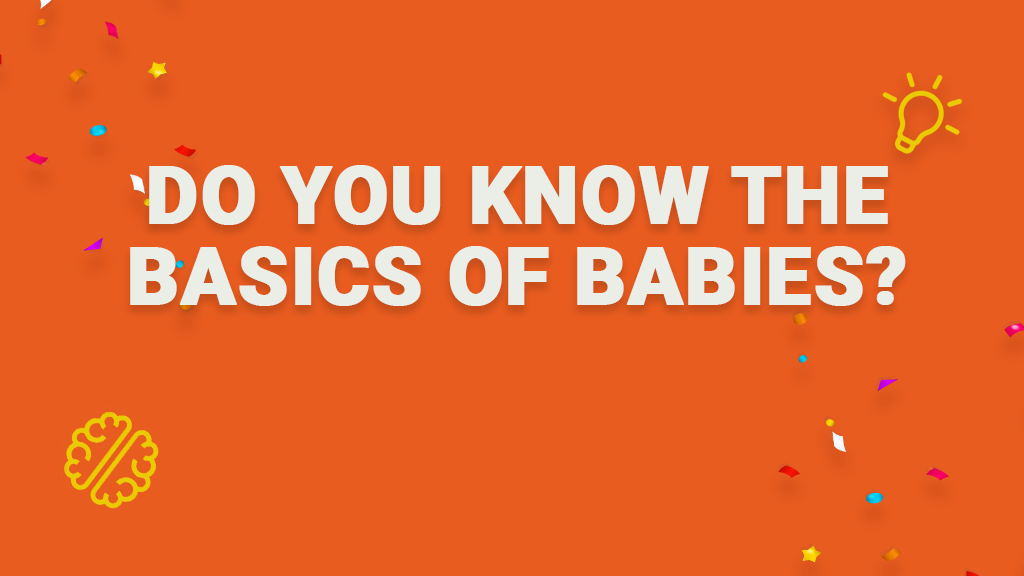❤️It's Trivia, but Sweeter❤️
Do You Know these Basics of Babies?

Understanding the basics of babies is essential for both new and experienced parents. From their physical development to emotional growth, babies go through several stages during their first year that are crucial to their overall well-being and future milestones. While each baby develops at their own pace, there are certain milestones that are commonly expected during the early stages of life. This content will help you better understand the developmental process of babies and provide some insights into their growth.
One of the first things to know about babies is their sleep patterns. Newborns typically sleep between 16 to 17 hours a day. It might seem like a lot of time spent asleep, but it’s a crucial period for their physical and cognitive development. At this stage, babies require deep sleep to grow, and their brains are busy processing information and forming connections. Their sleep is broken up into short intervals, as they wake up to feed frequently. As babies grow older, they gradually consolidate their sleep into longer stretches at night, although every baby’s sleep pattern can vary.
In the early months, babies are very dependent on their caregivers for everything from feeding to comforting. One of the first social milestones that babies reach is when they begin to smile in response to others. Typically, babies begin to exhibit social smiles around the two-month mark. This is a significant development because it indicates that they are beginning to engage with the world around them. Smiling is one of the first forms of communication babies use to express their happiness and joy, as well as to bond with those who care for them.
Along with social milestones, babies also start to develop their physical abilities. One of the first motor skills babies usually develop is the ability to lift their heads while lying on their stomachs. Around 6 months of age, most babies are able to sit up with minimal support. This is a critical milestone because it signifies growing muscle strength and coordination. Sitting up allows babies to observe the world around them more effectively and even engage in some play. With more head and torso control, babies also begin to roll over, which is another essential developmental milestone.
Another important aspect of infant development is the introduction of solid foods. For the first few months of life, babies rely solely on breast milk or formula for nutrition. However, around 4 to 6 months, most babies are ready to start experimenting with solid foods. The first solid food introduced is typically rice cereal, as it is easy to digest and less likely to cause allergies. Once babies are accustomed to rice cereal, they are gradually introduced to other foods, such as pureed vegetables and fruits. The introduction of solid foods helps develop their chewing skills and also provides essential nutrients that breast milk or formula alone might not offer.
It’s also important to understand reflexes that babies are born with. One of the most common reflexes seen in newborns is the rooting reflex. When something touches a baby’s cheek or mouth, they instinctively turn their head toward the touch and begin to open their mouths. This reflex is crucial for breastfeeding, as it helps the baby latch onto the breast to feed. Reflexes like this gradually disappear as babies grow and gain more voluntary control over their movements. As babies develop, they begin to make more intentional movements and engage with the world around them.
As babies near the 6-month mark, they continue to reach new milestones. They often begin to explore the world by rolling over from their stomach to their back and vice versa. This is an exciting time because rolling over indicates the strengthening of muscles and growing physical coordination. It also allows babies to move more freely and engage in play. Around this age, babies also begin to develop early language skills. Though they won’t be speaking words yet, babies begin to babble and experiment with making different sounds. This is the beginning of language development, and it lays the foundation for later speech.
By the time babies reach their first year, they have usually mastered a variety of physical and emotional milestones. One of the most exciting milestones for parents is when their baby says their first word. The first word is often something simple like “mama” or “dada,” but it marks the beginning of verbal communication. Babies also begin to develop the ability to understand simple commands or phrases. Around this time, they may also start to stand with assistance and may even take their first steps, although walking typically comes a little later.
In addition to physical and language development, babies undergo significant emotional and social growth during their first year. As babies interact more with caregivers, they begin to form bonds and attachments. Attachment is an essential aspect of emotional development. Babies who feel secure and loved tend to develop a healthy sense of trust, which positively influences their social and emotional development as they grow. Responsive caregiving—such as comforting a baby when they cry and engaging with them through eye contact, talking, and play—helps promote positive emotional growth.
Parents may also notice that babies begin to show preferences for certain people or objects during their first year. This behavior is a sign of growing attachment and a developing sense of security. Babies may show signs of separation anxiety when they are apart from their primary caregivers, which is a normal part of their emotional development. Though this can be challenging for both the baby and the parents, it is an important sign that the baby is forming deep emotional bonds.
One essential aspect of baby development is their cognitive abilities. As babies grow, they begin to learn about their environment and develop a sense of cause and effect. They start to understand that their actions can lead to certain outcomes. For example, babies may begin to shake a rattle to make noise or reach for a toy that they see in front of them. Cognitive development in babies is closely tied to sensory exploration and physical movement. As babies interact with the world around them, they are constantly learning and developing new skills.
Parents and caregivers play a vital role in supporting babies’ development during this time. Providing a safe and stimulating environment encourages babies to explore and engage with their surroundings. Talking to babies, reading to them, and encouraging them to interact with toys and objects can promote cognitive, emotional, and physical development. Healthy nutrition, adequate sleep, and regular pediatric checkups are also essential for ensuring that babies develop at a healthy and appropriate pace.
In conclusion, understanding the basics of babies and their development during the first year is crucial for parents and caregivers. Each baby progresses at their own pace, but there are certain milestones that are commonly seen during this time. From social smiles and rolling over to saying the first word and taking the first steps, the first year of a baby’s life is filled with exciting milestones. These developments lay the foundation for their future growth and set the stage for a lifetime of learning, exploration, and discovery. As caregivers, it’s important to be patient, attentive, and responsive, providing babies with the care and support they need to thrive.



